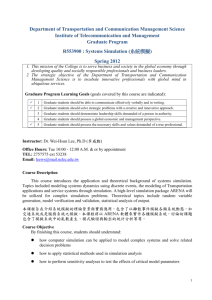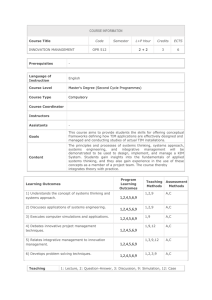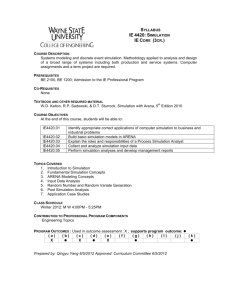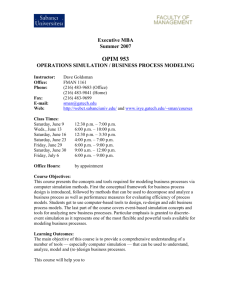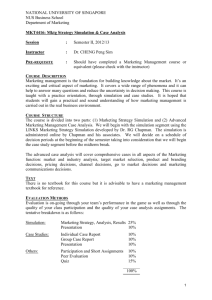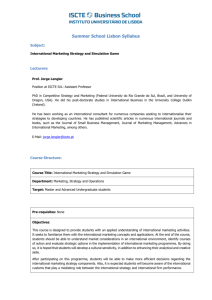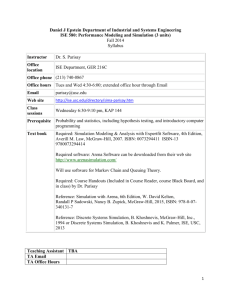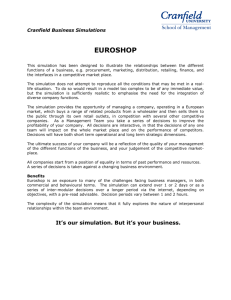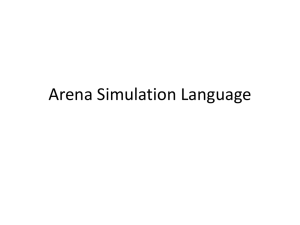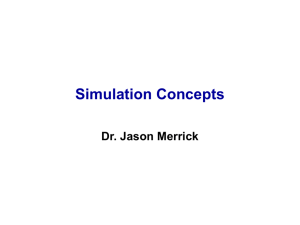BUS 439: Systems and Simulation
advertisement
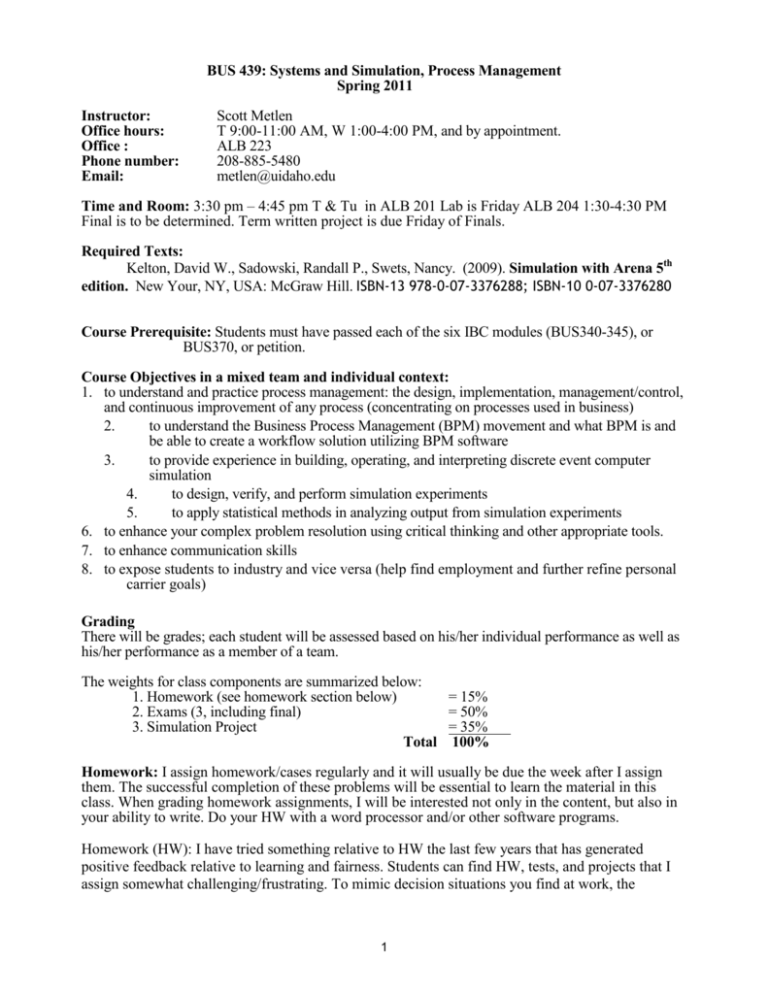
BUS 439: Systems and Simulation, Process Management Spring 2011 Instructor: Office hours: Office : Phone number: Email: Scott Metlen T 9:00-11:00 AM, W 1:00-4:00 PM, and by appointment. ALB 223 208-885-5480 metlen@uidaho.edu Time and Room: 3:30 pm – 4:45 pm T & Tu in ALB 201 Lab is Friday ALB 204 1:30-4:30 PM Final is to be determined. Term written project is due Friday of Finals. Required Texts: Kelton, David W., Sadowski, Randall P., Swets, Nancy. (2009). Simulation with Arena 5th edition. New Your, NY, USA: McGraw Hill. ISBN-13 978-0-07-3376288; ISBN-10 0-07-3376280 Course Prerequisite: Students must have passed each of the six IBC modules (BUS340-345), or BUS370, or petition. Course Objectives in a mixed team and individual context: 1. to understand and practice process management: the design, implementation, management/control, and continuous improvement of any process (concentrating on processes used in business) 2. to understand the Business Process Management (BPM) movement and what BPM is and be able to create a workflow solution utilizing BPM software 3. to provide experience in building, operating, and interpreting discrete event computer simulation 4. to design, verify, and perform simulation experiments 5. to apply statistical methods in analyzing output from simulation experiments 6. to enhance your complex problem resolution using critical thinking and other appropriate tools. 7. to enhance communication skills 8. to expose students to industry and vice versa (help find employment and further refine personal carrier goals) Grading There will be grades; each student will be assessed based on his/her individual performance as well as his/her performance as a member of a team. The weights for class components are summarized below: 1. Homework (see homework section below) = 15% 2. Exams (3, including final) = 50% 3. Simulation Project = 35% Total 100% Homework: I assign homework/cases regularly and it will usually be due the week after I assign them. The successful completion of these problems will be essential to learn the material in this class. When grading homework assignments, I will be interested not only in the content, but also in your ability to write. Do your HW with a word processor and/or other software programs. Homework (HW): I have tried something relative to HW the last few years that has generated positive feedback relative to learning and fairness. Students can find HW, tests, and projects that I assign somewhat challenging/frustrating. To mimic decision situations you find at work, the 1 questions are open-ended, vague and often deal with open ended and vague scenarios where finding the optimal answer may not be possible. Because the scenarios mimic situations you will encounter when you become managers, or require the type of insight/understanding you will need as managers I feel it is important to continue with such questions. In the past, many students would answer superficially (at least in my opinion), get a poor grade, get upset, and not learn. In addition, some student teams would not work as teams; there was free riding, some dissent, and general team problems. Team problems are an issue you will be facing the rest of your business career. When a team member is experiencing serious life issues, other team members will often step up and cover for that member. However, when a team member abuses such privileges when there is no serious issue, they are often fired. In this class, teams can either ‘discipline’ a team member with a lower grade and/or ‘fire’ an individual from the team for not participating fully after documented efforts directed towards complete participation by all. The last effort towards complete participation would be enlisting my help in motivating participation. If a person is fired from a team, they will receive a zero on the homework and project portions of the class making it impossible to pass the course. For the final project you will choose your own team, 3-6 members. Homework is a team effort. I will assess some of the homework and hand it back with feedback of displayed ability and guidance of how to improve (if it is possible to improve the answer). Given the homework displays a good-faith effort, the grade will be 1/1. However, if a good-faith effort is not displayed or no homework is handed in, the grade will be 0/0. Feedback for most homework will consist of me supplying the answer and you, the student, determining where you went wrong. To achieve high performance on the test and project, it is imperative that homework material is not only understood, but that you can perform at a high level in completing the homework tasks. Tests are in the evening and are long. I will evaluate the tests and project. If a person scores below an 80% on the first two tests, they will have an option of retaking a like test with the stipulation that the highest score achievable is an 85%. Such a score is analogous to weighting the two tests in some manner, but it gives an individual who scored below a 70 the opportunity to achieve a high grade and still have some ownership of their poor performance on the first try. For example, if a person scored a 30% on the first try and a 95% on the second and the weights were 40% and 60% respectfully, that person would only earn a 69%, yet that person would have displayed mastery over the subject. Under the business rule stated, that person would receive an 85%. The weight of each test score for the final grade will be 14% low score, 17% middle score, and 19% high score. Final letter grade for the class will be assigned based on your final score: 89.5+ = A, 79.5 to 89.4 = B, 69.5 to 79.4 = C, 59.5 to 69.4 = D, 59.4- = F. Special notes 1. Class attendance is expected. If you miss a class, you are responsible for catching up. If your absence is for a good reason (my opinion, with a minimum bound based on University excused absences), I will help you catch up. 2. A lap top computer is necessary to complete this course. You must down-load Arena from my website http://www.webpages.uidaho.edu/~metlen/ > BUS439 Simulation > Arena. Activation of the software will be accomplished during the first lab. 3. Except for the final, examinations will be prearranged and at night. All tests will be completed on a 2 computer and be open book/computer/note. The final may also be at night, depending on the agreement of all in the class 4. Each team must complete a simulation/workflow project of a process or processes relative to process management utilizing Arena and possibly Savvion software. As a class, we will determine the guidelines of this project within the bounds of four deliverables: term project proposal, an intermediate progress project report, a final report, and an oral presentation by the team. All members of each team must collaboratively present the completed project to the management of the participating organization. Travel to the firm is required to gather information and determine project scope and then to present the final recommendations. 5. Academic honesty and integrity are core values at the University of Idaho; academic dishonesty or misconduct is NOT tolerated. Cheating and plagiarism violate UI’s code of academic conduct [Student Code of Conduct 2300 – UI handbook]. Anyone found cheating on course examinations, quizzes, and assignments, will receive an “F” in the course and will have a letter noting the incident attached to their permanent file. University administrators may take further disciplinary actions. 6. Note for Students with a documented disability: Reasonable accommodations are available for students who have a documented disability. Please notify the instructor during the first week of class of any accommodation(s) needed for the course. Late notification may mean that requested accommodations might not be available. All accommodations must be approved through Disability Support Services located in the Idaho Commons Building, Room 333 (phone: 885-7200; email: dss@uidaho.edu; website: www.access.uidaho.edu or www.webs.uidaho.edu/aap. 7. This class is divided into four parts: 1) What is a process and process management: Relative to process management, what are/is the: Current state (where are we) Problem and advantage with current state (where are we) What is a better alternative (where should we go, BPM) How do we reach the better alternative (how are we going to get there) Is it worth the journey (is it worth it) 2) Creating schematics of processes, Savvion and Arena Drawing pictures, gathering data, understanding activities within each step of a process, understanding inputs, understanding process/step/input/activity control, knowledge management, business rules 3) Simulating processes using discrete event simulation, Arena & Savvion. Developing, debugging, executing, verifying, analyzing, reporting findings, performing sensitivity analysis of simulations of processes, and developing workflows. 4) Putting the above three parts together in a project of an operational or soon to be operational process or set of interconnected processes for an organization. The following schedule is vague so that we, as a class, can retain the freedom to pace the class at a rate where the majority are understanding concepts and developing the necessary skills to accomplish the various deliverables. The pace will not be slow and there will be an exam following each time period listed. Many people are not comfortable with such a vague schedule because they want to allocate their time across other class and life requirements. That is not a problem in this case, including class time; 3 just allocate at least 10 to 12 hours per week to this class evenly paced across the week. Additional readings will be suggested as we progress. Week 1-4, part one above. Read Process Management information under ‘Supplementary’ section of web site, and Ch 1 & 2 of Arena book as quickly as possible and goggle. As you read, address the questions listed in part one. Also, write down questions for discussion in class that you would like clarified. Week 5-6, part two above. Selected readings and exercises from Arena book and Savvion material, enough to complete assignments, forthcoming. Week 7-end, part three & four above. Selected readings and exercises from Arena book and Savvion material, enough to complete assignments, forthcoming. Treat people as if they were what they ought to be, and you'll help them to become what they are capable of becoming. -Goethe 4
